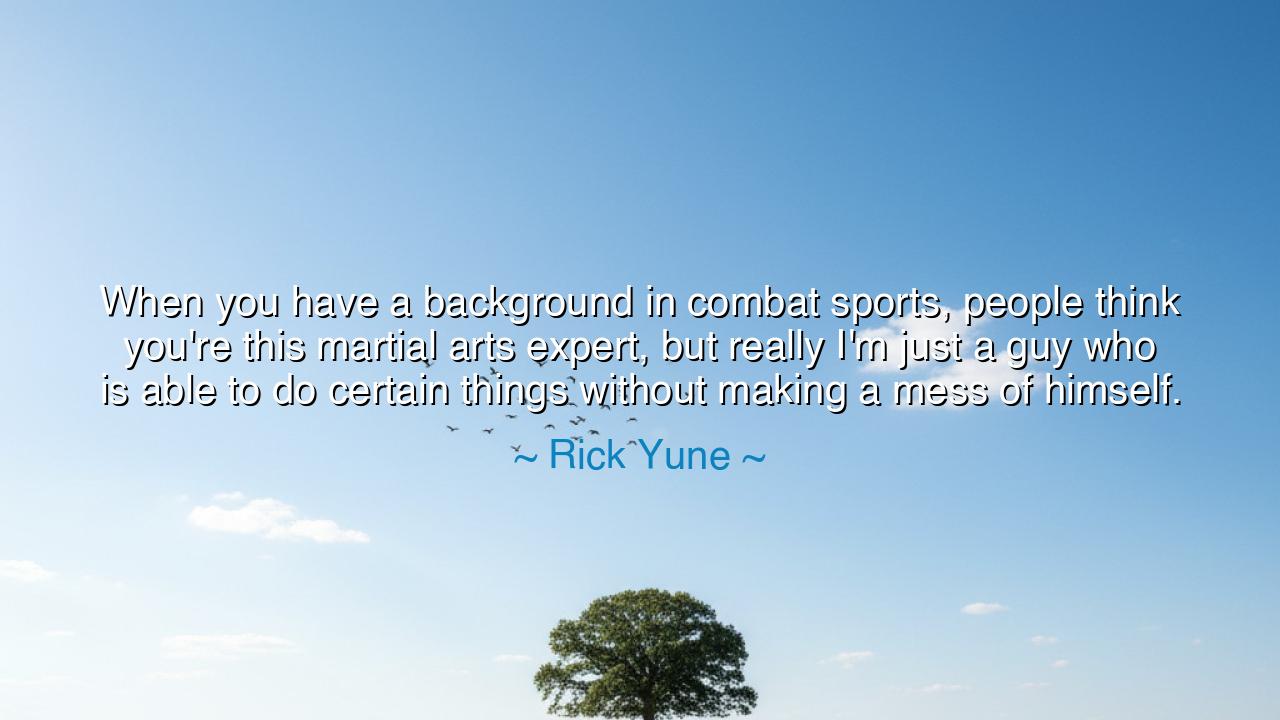
When you have a background in combat sports, people think you're
When you have a background in combat sports, people think you're this martial arts expert, but really I'm just a guy who is able to do certain things without making a mess of himself.






The words of Rick Yune strike with a quiet humility, like the whisper of a warrior who has seen both the spectacle and the shadow of discipline: “When you have a background in combat sports, people think you’re this martial arts expert, but really I’m just a guy who is able to do certain things without making a mess of himself.” In this simple confession lies a lesson that shines brighter than any trophy: that true mastery is not about claiming the title of legend, but about moving through the world with balance, control, and self-knowledge.
The ancients knew well that appearances deceive. The samurai, clad in armor and feared in battle, were not praised merely for the stroke of the sword, but for their restraint in sheathing it. The Stoics of Greece declared that virtue was not in conquering others, but in ruling oneself. So too, Rick Yune reminds us that the measure of a man with combat sports behind him is not in the myths others project upon him, but in his own quiet ability to act with grace, to perform without chaos, to live without leaving destruction in his wake.
Think of Miyamoto Musashi, the great Japanese swordsman who won countless duels. By reputation, he was a fearsome martial arts master, yet in his writings he spoke not of glory in battle, but of clarity, discipline, and balance. He too revealed that the true secret was not invincibility, but composure—the art of not making a mess of oneself in the heat of life’s struggles. Yune, though an actor and athlete, echoes the wisdom of Musashi: that the world may call you a master, but the essence of mastery is humility and steadiness, not spectacle.
The quote also speaks to the burden of perception. When people see the mark of training—whether in combat, art, or knowledge—they assume a kind of perfection. Yet the one who carries the training knows the truth: he is still human, still learning, still stumbling. Yune’s humility pulls back the veil. He does not declare himself a hero, but a man who through discipline has learned to move carefully. This is the true strength of the warrior—not the arrogance of invulnerability, but the wisdom of limitation.
For us, the lesson is profound. Each of us carries skills, talents, or reputations that others may misjudge. Some may think you stronger than you feel, wiser than you are, or more perfect than you can be. Do not be burdened by these illusions, nor seduced by them. Instead, follow Yune’s teaching: be content to move with dignity, to act with restraint, to do what you can without stumbling into chaos. Grace is not about dazzling others—it is about not betraying yourself.
Practically, this means learning the art of self-control. Train your body, but also your speech and your temper. Do not let praise make you careless, nor expectation make you false. Walk with the steadiness of one who knows his limits and honors them. When you err, correct yourself quietly. When you succeed, wear your triumph lightly. As Yune says, the aim is not to be crowned a master, but to keep from making a mess of your path.
Thus, let this teaching sink deep: mastery is not the roar of the crowd, but the quiet rhythm of a life lived with balance. The one who can hold himself steady in the storm, who can act without ruin, who can endure without pride—that one is the true warrior. The world may call you expert, but you will know the deeper truth: you are simply a man or woman striving each day to walk cleanly, without chaos, and with dignity.
For in the end, greatness is not in the myth others create about you, but in the calm and steady way you create yourself.






AAdministratorAdministrator
Welcome, honored guests. Please leave a comment, we will respond soon